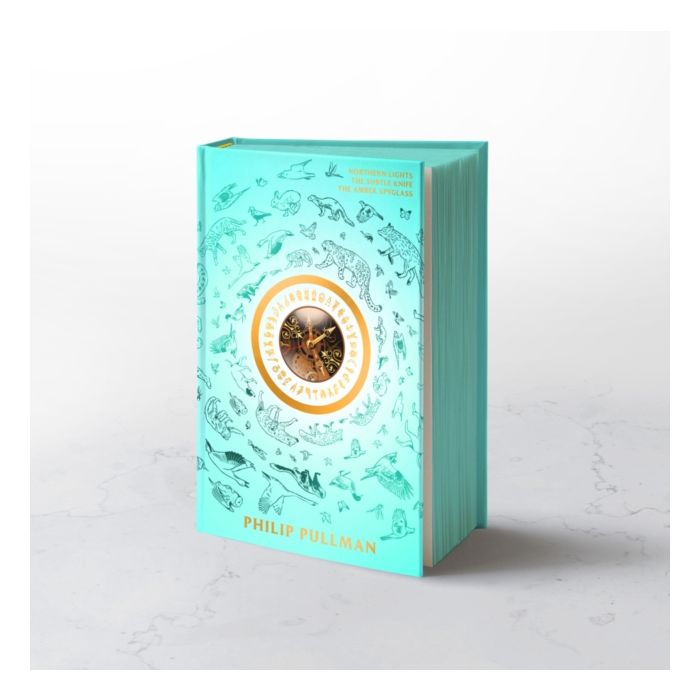His Dark Materials Book Series: A Comprehensive Exploration

The His Dark Materials trilogy, penned by Philip Pullman, is a monumental achievement in fantasy literature, captivating readers worldwide with its intricate plot, richly developed characters, and profound exploration of philosophical and theological themes. This article delves into the series, examining its literary merit, cultural impact, and enduring appeal across various media. We will explore the books themselves, the author’s background and influences, the educational value and life lessons embedded within the narratives, the series’ presence in libraries, and its significant cultural impact.

The Books: A Journey Through Parallel Worlds
Philip Pullman’s His Dark Materials is an epic fantasy trilogy comprising Northern Lights (published as The Golden Compass in North America), The Subtle Knife, and The Amber Spyglass. The series follows the intertwined journeys of Lyra Belacqua and Will Parry, two children destined to navigate a complex multiverse of parallel universes. Each book expands upon the preceding one, building a richly detailed cosmology and weaving a compelling narrative about courage, friendship, and self-discovery.
Genres and Classifications: While primarily categorized as fantasy for young adults, His Dark Materials transcends typical genre boundaries. It incorporates elements of adventure, science fiction (with its exploration of parallel worlds and scientific concepts), and philosophical fiction (with its deep engagement with questions of faith, free will, and the nature of reality). The series also touches upon the historical and religious context of early modern Europe, lending further depth and complexity to the narrative. Its sophisticated themes and mature exploration of significant issues have led it to be equally embraced by adult readers.

Bestsellers and Awards: The trilogy has achieved remarkable commercial success, reaching bestseller lists across various publications, including the New York Times, Wall Street Journal, and Publishers Weekly. The critical acclaim is equally impressive; The Amber Spyglass won the 2001 Whitbread Book of the Year (now the Costa Book Award), a prestigious recognition of its literary excellence. Northern Lights garnered the Carnegie Medal for children’s fiction in the UK in 1995, a testament to its powerful story and impactful portrayal of childhood. The trilogy’s overall impact is further evidenced by its third-place ranking in the BBC’s Big Read poll in 2003, reflecting its lasting impression on a broad spectrum of readers.
Beyond the Trilogy: In addition to the main trilogy, Pullman has enriched the His Dark Materials world with two supplementary novels: Lyra’s Oxford and Once Upon a Time in the North. Lyra’s Oxford, a sequel to The Amber Spyglass, offers a glimpse into Lyra’s later life and delves further into the consequences of the events of the main narrative. Once Upon a Time in the North acts as a prequel, providing an enriching backstory to the beloved aeronaut Lee Scoresby and his foundational relationship with the armored bear, Iorek Byrnison. These supplementary novels provide further insight into the characters and the universe they inhabit, enhancing the overall reading experience and offering a deeper understanding of the multifaceted world created by Pullman.
Thematic Exploration: Dust, Daemons, and the Authority

Central to the His Dark Materials series is the concept of “Dust,” a mysterious particulate matter associated with consciousness and the nature of human experience. Pullman masterfully uses Dust to explore the complexities of religious dogma and the clash between scientific inquiry and spiritual belief. The concept of daemons—physical manifestations of a person’s soul—further enhances the series’ exploration of identity and free will. The Authority, a tyrannical figure identified with God, adds another layer of intrigue, drawing upon real-world religious debates and philosophical inquiries.
Philip Pullman: Author and Inspiration
Understanding the author is crucial to understanding his work. Philip Pullman’s intellectual curiosity and wide-ranging interests profoundly influence His Dark Materials. His personal experiences, reading habits, and engagement with diverse fields of knowledge are all reflected in the rich tapestry of the books.
Biographies and Writing Style: Pullman’s background is characterized by a deep love of storytelling and an inquisitive mind. His writing style is characterized by its evocative language, intricate world-building, and a profound intellectual depth that engages the reader on multiple levels. Pullman seamlessly blends high-fantasy elements, such as witches and armored polar bears, with scientific and philosophical concepts, creating a sophisticated narrative that appeals to both young and adult readers. His narrative voice is both accessible and thought-provoking, capable of explaining complex ideas to a younger audience without dumbing down the profound insights.
Inspirations and Influences: Pullman draws inspiration from diverse sources, including mythology, folklore, classic literature, and scientific theories. These influences are woven into the fabric of the His Dark Materials world, enriching its cosmology and providing a basis for its profound exploration of existential themes. He also draws heavily on his own lived experiences, incorporating his reflections on childhood, faith, and human nature into the compelling narrative. His knowledge of philosophy and theology, in particular, is evident in the trilogy’s complex and layered exploration of religion, free will, and morality.
Reading and Learning: Educational Value and Life Lessons
His Dark Materials offers significant educational value beyond its entertaining narrative. The books provide compelling contexts for exploring complex concepts in science, philosophy, and theology.
Summaries and Educational Value: The books introduce complex concepts of physics and cosmology in an accessible and engaging way. The exploration of parallel universes allows for the discussion of diverse scientific theories and ideas, opening the readers’ minds to broader scientific possibilities. Beyond science, the books delve into the historical and religious structures of early modern Europe, providing a rich background for understanding the social, political and spiritual landscapes of that period.
Life Lessons and Reading Habits: The series teaches valuable life lessons related to self-discovery, personal agency, and courage in the face of adversity. Lyra and Will’s journeys, replete with moral dilemmas and challenges, serve as inspiring examples of resilience and integrity. The themes of rebellion against authoritarianism, the power of love and friendship, and the importance of questioning authority foster critical thinking and encourage readers to develop their own personal values and perspectives. The series promotes reading as a voyage of self-discovery and a tool for critical engagement with the world.
Libraries and Archives: Preserving the His Dark Materials Legacy
The enduring popularity of His Dark Materials has ensured its prominent place in libraries and archives worldwide.
Public and Digital Libraries: The series can be found in countless public libraries, providing accessible narratives to young and adult readers. Its wide circulation fosters community engagement with literature. The digital accessibility of His Dark Materials through e-libraries expands its reach further, breaking geographical barriers and making the books available to a wider audience.
Rare Collections and Archives: While not necessarily containing rare copies of the original publications, academic and specialized libraries dedicated to children’s literature and fantasy fiction are likely to include the series in their collections for research and preservation of its contribution to the genre. These collections serve as vital resources for literary scholars and researchers.
Cultural Impact: Adaptations, Awards, and Communities
His Dark Materials has transcended its literary origins to have a considerable cultural impact.
Literary Influence and Adaptations: The trilogy’s influence on subsequent fantasy literature is undeniable. Its compelling narrative, intricate world-building, and thought-provoking themes have inspired numerous authors and continue to resonate with readers. The series has been adapted into various media, including a successful stage production and a highly-rated television series by the BBC and HBO. These adaptations have further popularized the series, introducing it to new generations of audiences and strengthening its cultural presence.
Awards and Communities: The awards received by His Dark Materials underscore its literary merit. However, its true cultural impact lies in its ability to foster vibrant communities of readers who connect with its themes and characters. Online forums, fan groups, and academic discussions surrounding the series are evidence of its enduring popularity and its power to spark intellectual conversations. The series continues to provide a platform for critical discussions surrounding philosophical, theological, and scientific concepts, stimulating intellectual engagement and broadening perspectives. This continued discussion and engagement solidify its place as a significant piece of cultural heritage.
In conclusion, Philip Pullman’s His Dark Materials is more than just a fantasy series; it’s a rich, multifaceted literary work that has resonated deeply with readers and has profoundly impacted culture. From its compelling narratives and philosophical depth to its extensive adaptations and lasting community engagement, His Dark Materials stands as a significant contribution to fantasy literature and continues to inspire and engage readers of all ages.